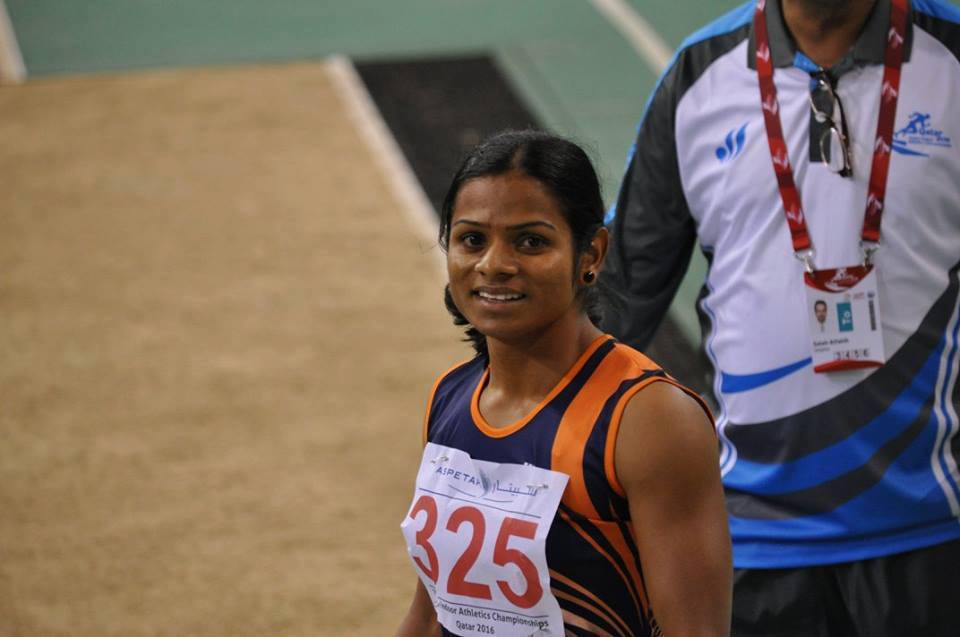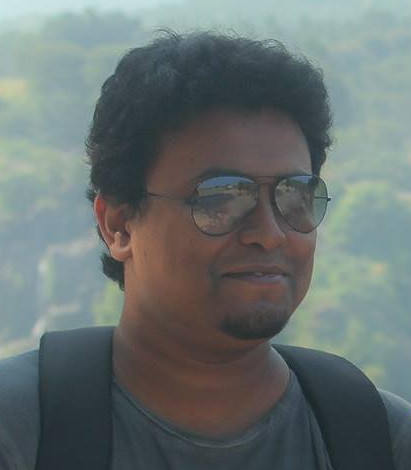Dutee Chand | The woman who stood the test of 'biological racism'

© Athletics Federation of India Facebook
Dutee is not the problem, but the system is a problem, an athlete cannot fail their gender
Santhi Soundarajan
“Dutee is not the problem, but the system is a problem, an athlete cannot fail their gender,” Santhi Soundarajan said after Dutee Chand was dropped from India's Commonwealth Games contingent after tests confirmed her hyperandrogenism in 2014. The situation was all too familiar for the Tamilian. Almost 10 years back, Santhi was stripped of her silver medal in the women's 800m race at the Asian Games, after failing a gender verification test. Few months later, after battling social stigma, she attempted to end her life, before being rescued by a friend.

 Santhi Soundarajan lies on the track after coming second in the Women's 800m Final during the 15th Asian Games Doha 2006 © Photo by Andy Lyons/Getty Images for DAGOC
Santhi Soundarajan lies on the track after coming second in the Women's 800m Final during the 15th Asian Games Doha 2006 © Photo by Andy Lyons/Getty Images for DAGOC“Is she a man? Is she a transvestite?”—these are the kind of questions Santhi faced back then. These are the questions Dutee Chand was left open to, when she failed her sex test as well.
The 20-year-old had a difficult start to her life in Odisha. Hailing from the historical place of Jajpur, which was the capital of the Kalinga Kingdom, Dutee was born to a poor weaver couple. She is the third among the seven siblings—six sisters and one brother. It is not a comfortable choice for someone from such a background to pursuit sports professionally. However, for Dutee, her elder sister Saraswati Chand was her cornerstone. Being a former athlete herself, who had won medals in the World Police Championships, Saraswati encouraged and inspired her sister to pursue her dreams—and boy did she run after them!
Ever since making her mark in the 2012 National Youth (U-18) Athletics Championship at the age of 16, Dutee Chand has been on a record-breaking spree. One year later, she made her international debut at the Asian Athletics Championship and won a bronze medal in the women's 200m event. That year, she also became the first Indian to reach the final of a global athletics event at the World Youth Championship.
"Sure shot Olympic medallist"—Sports Authority of India's (SAI) director general Jiji Thomson had said back then, about the uber-talented athlete, who idolizes Jamaican great Usain Bolt. Very few Indian track and field athletes had commanded such attention and confidence at such a young age.
Glasgow was hosting the 2014 Commonwealth Games and Indian contingent were hopeful of a significant medal haul, especially with Dutee in their ranks. However, just like her meteoric rise, her dreams of representing her nation in Glasgow, and pursuing a career in the sport for that matter, was shattered in a dramatic string of events.
Just days before the Games, she was dropped from the Indian contingent after she failed a sex test. It was found that she has hyperandrogenism—the level of testosterone in her body was higher than the limit set by the IAAF for women athletes.
Gender determination in sport is a disputed domain. There has always been a concern about men masquerading as women, since women have started to compete in sports—which is actually surprising, considering how rare such a thing has been in history.
Initially, sex determination test (which was started by IOC in 1968) was as crude as asking the athletes to drop their underwear. Later, this was replaced by testing swabs of cheek tissue for chromosome.
Initially, sex determination test (which was started by IOC in 1968) was as crude as asking the athletes to drop their underwear. Later, this was replaced by testing swabs of cheek tissue for chromosome. The demarcation was simple: XX for women, and XY for men. However, Spanish athlete Maria Jose Martinez-Patino was the first woman who pointed out the flaw in this method. Her test result showed the presence of a Y chromosome, and it was only after a three-year long battle, where she refused to retire and bow down, did she confirm that the Y chromosome was a result of a rare genetic disorder, and that the high testosterone in her blood actually had no effect on her.
However, South African athlete Caster Semenya's rise to prominence brought up this disputed issue once again. Her competitors frowned at her success, and her wondrous physical attributes. Questions were raised about her gender after her stunning performance at the World Championships in 2009, and it ensued a controversy that shook the sport to its foundation.

 Caster Semenya reacts after competing in the Women's 800m Semifinals of the London 2012 Olympics © Photo by Clive Brunskill/Getty Images
Caster Semenya reacts after competing in the Women's 800m Semifinals of the London 2012 Olympics © Photo by Clive Brunskill/Getty ImagesCivic leaders, politicians, former sports personalities, human right activists—everyone had an opinion, and most of them agreed on the fact that the IAAF should have handled the issue way better than they did, and that this matter should not have turned into a public spectacle, especially when the governing body was dealing with something which is so private and intimate for a human being.
At the end of the storm, the IAAF and IOC's Medical Commission came up with an upper limit for testosterone which will be permissible for a women athlete—10 nanomoles per litre of blood. It was supposed to level the playing field, and deny athletes of any undue advantage.
A lot of athletes had to undergo hormone suppression therapy, and some even went under the knife (genital surgery) in order to keep their testosterone level within the norms. However, Dutee Chand refused to do so.
The Indian sensation was not willing to change who she was, naturally, in order to abide by some rules, which is yet to have any proper scientific verification. Her test results were made public, and her sexuality became the topic debate on national televisions and newspaper.
Michael Phelps was not banned for his out-of-proportion wingspan, which gave him an advantage over the rest of the field. Bradley Wiggins' extraordinary cardiovascular system and Usain Bolt's long legs were not treated as unfair advantages.
The obvious questions which accompanied this ruling was: Why is there an upper limit on something which a person has inherited naturally? Nature does not deal in binary. It is obnoxious to level someone as 'not a woman' just because she does not fit into a definition. Why are there no such restrictions on male athletes? Michael Phelps was not banned for his out-of-proportion wingspan, which gave him an advantage over the rest of the field. Bradley Wiggins' extraordinary cardiovascular system and Usain Bolt's long legs were not treated as unfair advantages.
Dutee decided to stand up against this, though, and fought against these rules, despite having to put up with all the social excruciation that usually accompany matters such as these. She submitted her case to the Court of Arbitration for Sport (CAS), and eventually, CAS passed a landmark judgment.
CAS suspended IAAF's hyperandrogenism regulation for two years, and asked the governing body to provide substantial evidence that high androgen levels can actually be linked with high performance in an athlete during this time period. The ruling cleared Dutee Chand from participating in events once again, along with a lot of other athletes around the world.
In a nation where the third gender is still overlooked, and issues regarding someone's sexuality is considered a taboo, it was heartening to see the kind of support Dutee garnered at that time.
Her return to action has been swift and glorious. After winning a silver and a bronze medal at the 2016 South Asian Games, she helped India break an 18-year-old national record in 4x100m women relay event at the IAAF World Challenge in Beijing. The cherry on the top was, however, her performance at the G Kosanov Memorial International Athletics Meet at Kazakhstan on Saturday, when she won the silver medal each in the 100m sprint and the 4x100m relay event. In the 100m event, she created history by becoming the first Indian in 36 years to qualify for this event at the Olympics, since PT Usha did so in 1980. The grandness of this achievement was only heightened by what she has had to go through to reach here, many would not have made it so far on the path she has had to take.
In a sense, it was also a moment of pride for all the people who stood alongside her and supported her during her fight. Right from Dr. Payoshni Mitra, a researcher on gender issues, who galvanized opinions and took the case to CAS, to SAI, who took on all the expense of her case, to the Indian media, who backed her to the tilt.
In a nation where the third gender is still overlooked, and issues regarding someone's sexuality is considered a taboo, it was heartening to see the kind of support Dutee garnered at that time. In way, Dutee's triumph has been an inspiration for every person in this nation, who is fighting against gender discrimination in some form of the other.
These Indian kids can create footballing history, but they need your help. You can help Slum Soccer send 20 of our most talented footballers to represent INDIA at the Homeless World Cup at Glasgow. Click here to know more.
